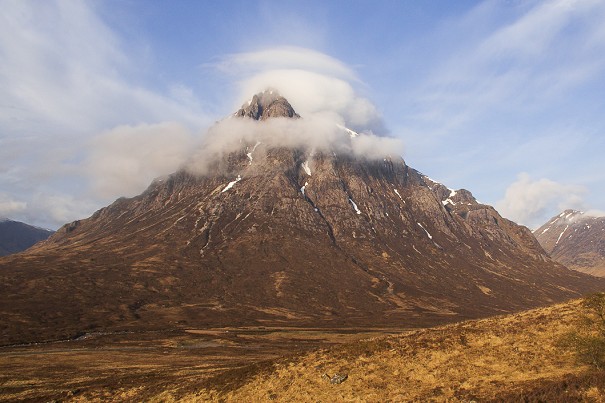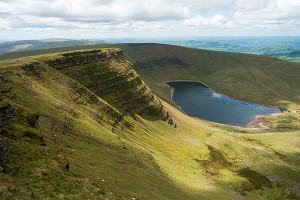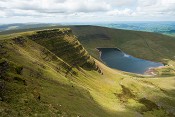
Last week's news widely reported the announcement by the Snowdonia National Park Authority (Awdurdod Parc Cenedlaethol Eryri) that the Welsh names Eryri (Snowdonia) and Yr Wyddfa (Snowdon) will now be favoured in all National Park material in both Welsh and English. This sparked an interesting - and largely intelligent - discussion in the forums. However, we were left with unanswered questions. We've put these to the National Park, and an expert in Welsh hill names.
Should UKH & UKC follow the Park's lead? Take part in our poll...
UKHillwalking: Is the Park just going to use Eryri and Yr Wyddfa in all English language material, or will the names in English publications now appear in bilingual form as Eryri (Snowdonia) and Yr Wyddfa (Snowdon)?
SNPA: We understand that many will be unfamiliar with the Welsh names, therefore in order to give people time to familiarise themselves with the Welsh names and adjust to the new policy the move towards using the Welsh names only will be a continuous one. In certain contexts, e.g. public engagement and education, we will include the English names in brackets for the time being. In time, as people become more familiar with the Welsh names this practice will be phased out.
The Park Authority's name is set in law, therefore it will continue to be referred to as the Snowdonia National Park Authority.
UKHillwalking: How does the park propose to educate English-only speakers so that confusion can be avoided?
SNPA: The support we have received since the announcement has been overwhelmingly positive by both Welsh speakers and non-Welsh speakers. Along with the support there is a clear eagerness to learn how to pronounce the names. Over the coming weeks we will be looking at ways in which we can help people gain confidence in the pronunciations.
We have a well established Eryri Ambassador scheme with just under 800 qualified ambassadors. Many of these ambassadors are businesses owners or managers in the area's tourism/recreation sector. As part of the Ambassador qualifying training there is an entire module dedicated to the Welsh language – therefore our ambassadors are ready and well equipped to encourage and help visitors to adapt to the new policy.
The Welsh language is one of Eryri's (Snowdonia) special qualities. Through our work in raising awareness of this special quality we will be educating people about place names (including Eryri and Yr Wyddfa) and their role in our cultural heritage. By gaining an appreciation for our place names and an understanding of their connection with the landscape, wildlife and history, we hope that people will embrace and use them to enrich their visitor experience.
UKHillwalking: Did the decision of the Park Authority take into account the historic roots of the name Snowdon? And does the park see a distinction between contemporary re-naming into English of existing Welsh placenames, and a name such a Snowdon that has been around in some form for many centuries?
SNPA: Yes, the decision took into account the fact that Snowdon is a historic name, dating back at least 800 years. Such historic place names are recognised as being an important part of the cultural heritage of the area, distinct from more recent coinages, which often rename places and features with existing Welsh names. To this end, Yr Wyddfa is unique in Eryri, as the only summit with two historic names, one in Welsh and one in English.
Over recent years, the National Park Authority has prioritised the names Yr Wyddfa and Eryri in English language text, following the Welsh names with (Snowdon) and (Snowdonia). This change has been widely accepted and popular English language publications and broadcasts such as the Guardian, Telegraph, Times and BBC Countryfile have adopted the form.
The Authority's decision took these factors into consideration, and ultimately, members felt that using the Welsh names in both Welsh and English would be a worthy celebration of our exceptional cultural heritage and of the Welsh language and place names as some of the area's most precious special qualities.
Pronunciation for non-Welsh speakers:
Yr Wyddfa urr-with-vah
Eryri err-uh-ree (roll those r's)
View from a Welsh hill name expert
To give the discussion some extra depth, we asked Welsh hill aficionado Myrddyn Phillips for his take. Myrddyn is joint author - with Aled Williams - of our guide to Welsh (Cymraeg) for hill-goers:
UKHillwalking: As you understand it, what are the historical origins of the names Snowdon/Snowdonia and Yr Wyddfa and Eryri?
Myrddyn: The excellent Dictionary of the Place-Names of Wales by Hywel Wyn Owen and Richard Morgan documents the name of Snawdune recorded in 1095, with the elements being Old English snāw (snow) and dūn (hill). Whilst the origins of the name Yr Wyddfa can be traced back to the name Weddua vaur recorded in 1284, with the elements composing gwyddfa (tumulus, grave) and mawr (big). The use of each name will of course precede each recorded instance.
Again the Dictionary of the Place-Names of Wales gives documental records for the use of the name Ereri in 1191 and Snoudonia…terram Snaudoniae in 1284.
UKHillwalking: Given the long usage of both forms, do you think it's 'fair' (for want of a better word) to favour just the Welsh versions in all the National Park's English language material?
Myrddyn: Simply put, yes. I don't think 'fair' comes in to the debate, logic should though. This relates to a Welsh hill and where it is situated. If Welsh names exist for both, which they do, then use them.
UKHillwalking: Do you think the Park's decision is realistic: what are the chances of English-only speakers adopting or understanding the Welsh, and how might one go about educating people to do so?
Myrddyn: As a Welsh person who can only speak English I often enjoy countering such a question and trying to put myself in the proverbial shoes of let's say, a person who can only speak Welsh who is confronted by an English name. In this instance I suspect they would try their utmost and use an appropriate name in an appropriate context. Reverse logic dictates that a person who speaks English, but not Welsh, such as myself, do likewise. In such a circumstance as this I would suggest that the names Yr Wyddfa and Eryri are the most appropriate ones to use.
Possibly the best educational tool in this circumstance is to do what the National Park plan on doing, and that is just use the Welsh names Yr Wyddfa and Eryri; I'm sure people will get used to it in time. On a personal note, when I first discovered the hills I mainly used the English name of Snowdon and Snowdonia; I now do my utmost to use Welsh names where they exist, including that of Yr Wyddfa and Eryri.
UKHillwalking: Aside from the historical bilingual name of Snowdon itself, what do you think about the tendency more recently to rename into English places with perfectly good existing Welsh names?
Myrddyn: In general any language should be respected, and this applies equally to English as it does to Welsh. However, respecting a language should also be characterised by its use, and unfortunately there are instances where long standing Welsh names have been supplanted by newly created English names. The use of the Welsh language is historical, cultural and contemporary, it is a living embodiment of the country of Cymru and transferring Welsh names into English should be considered regressive and countered at every instance. This applies equally to a house name as it does to the iconic status of Yr Wyddfa.
UKHillwalking: While many non-Welsh speakers exclusively use the name Snowdon, some who like to make an effort with Welsh placenames might (rightly or wrongly) have said Snowdon in reference to the whole massif, but Yr Wyddfa for the highest summit. If we do away with English, does the Welsh name cover both the high point and the entire thing?
Myrddyn: Cadair Idris is similar as it has a summit named Pen y Gadair which some people also consider can be applied to the singular hill, with Cadair Idris applicable to the massif. In this instance I've always considered Cadair Idris to be the name of the hill and the massif to also be the hills of Cadair Idris. Similarly for Yr Wyddfa; the tumulus/grave is the summit area, but I've always considered this also applicable to the singular hill, whilst the topographical area taking in the accompanying hills is the Yr Wyddfa massif.
So what do you think?
Taking its cue from the Snowdonia National Park Authority (Awdurdod Parc Cenedlaethol Eryri), should UKHillwalking and UKClimbing now be referring to Eryri (Snowdonia) and Yr Wyddfa (Snowdon)?
You can vote yes or no in the forum thread below...
- REVIEW: Rab Nitron 25L Pack 22 Aug
- INTERVIEW: James Gibson on the Martin Moran Round Record 18 Aug
- REVIEW: Montane Terra and Jetstream Shorts 5 Aug
- REVIEW: Rab Downpour Trail Lite and Phantom - ultralight shells for runners and backpackers 29 Jul
- REVIEW: Upland by Ian Crofton 30 Jun
- REVIEW: Rab Trail Tee 23 Jun
- REVIEW: Lorpen T3 Trail Running Eco Socks 10 Jun
- REVIEW: Sea to Summit Airlite Towel 30 May
- REVIEW: Primus Ulti Stove System - Finally, a rival to the Reactor? 12 May
- REVIEW: Black Diamond Pursuit Carbon Z Poles 29 Apr
















Comments
How is it pronounced?
I believe it's "Ur Wuthvah" with a rolled "r" and a stress on the "vah". I heard a native Welsh speaker pronounce it that way.
From the article... my best approximation: urr-with-vah (roll the r)
https://youtu.be/EFKe1Ijyyfs
https://youtu.be/ojQtkeItDgM
Eryri, according to a Welsh speaker I know is pronounced Er-uh-ree, with rolled 'r's.
I've heard it said before with the first syllable lengthened and emphasised.